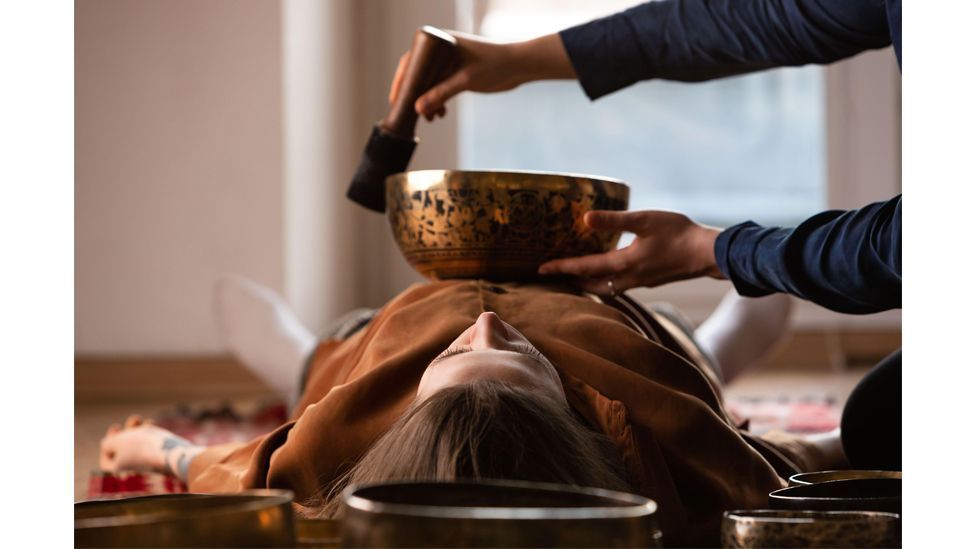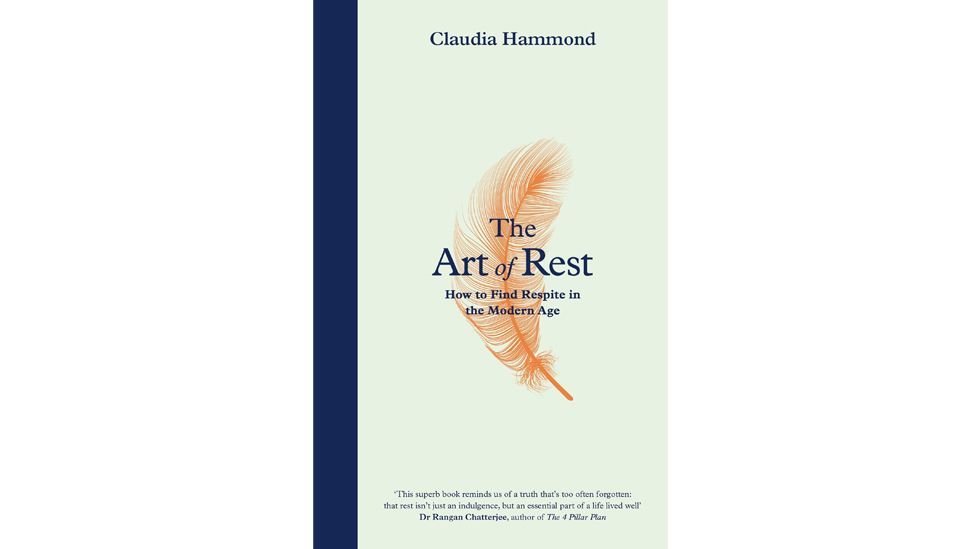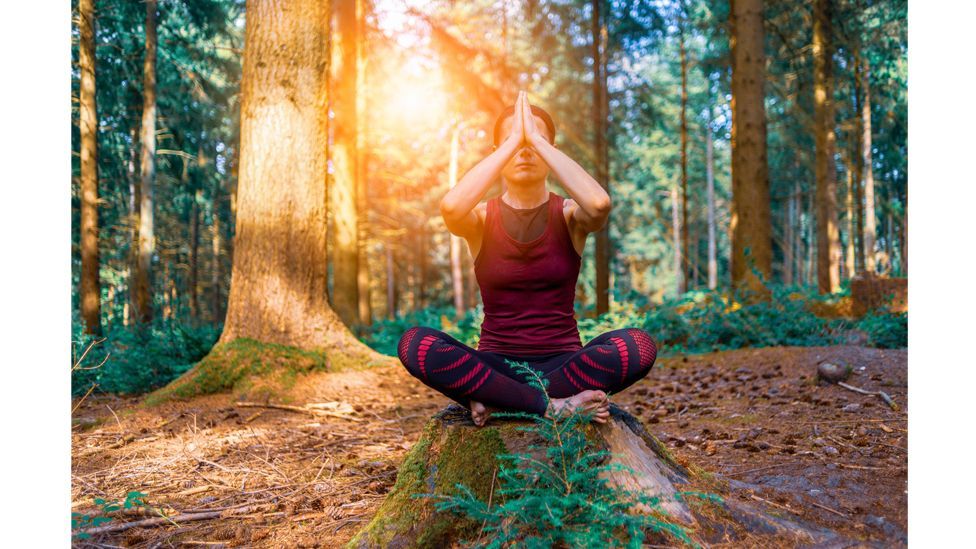You Create Art We Take Care of the Rest
How rest and relaxation became an fine art

Finding respite in our decorated world is increasingly important. Bel Jacobs explores the realm of rest, from dopamine fasting to 'pleasure activism'.
L
Last year, Rotterdam-based design student Kirsten Spruit created a mixed media installation titled A Infinite for Lingering. Visitors are invited to lie down on an expansive black mattress, slip on headphones that plays resonant soundscapes, and practice cypher. An accompanying film using slow textual iterations ("I feel like I did nothing today") encouraged thoughts on passivity. Spruit reflects: "A Infinite For Lingering stems from a research around the feeling of restlessness, of e'er needing to be productive and efficient, that seems to dominate the lives of many, especially amid my generation."
More like this:
- How dressing up can make us happy
- Within the homes of remarkable artists
- The ultimate ability adornment?
Is this what rest has become? An showroom in a gallery, every bit if it's a relic of a halcyon past? Something we can do only when invited to equally part of an art event? Apparently, aye. Co-ordinate to Claudia Hammond, presenter of BBC Radio 4'south All in the Listen and author of The Art of Rest: "Busy-ness has get a bluecoat of honour. It's go something nosotros expect of ourselves and other people. Unfortunately, evidence shows that we do retrieve busy people are improve. Even residual has, in some ways, been commercialised. Look at the health movement. There's this idea you should exist doing things that are good for y'all."
The effect is taking its toll: we experience guilty when we rest so we don't do information technology enough. Earlier this yr, research revealed that Americans between the ages of 45 and 65 are more stressed today than people their age in the 1990s. The World Health Organisation has classified stress as the "wellness epidemic of the 21st Century".

In Tibetan tradition, gongs are believed to exist linked spiritually to the universe (Credit: Alamy)
No wonder. The pandemic has meant that we are simultaneously corybantic with worry, often housebound, and denied access to many of life'south almost restorative activities. If global emergencies are showing us annihilation, it's that one-time ways of living aren't working – for ourselves, for other people, for the planet. We need a reassessment, non simply of our own behaviours, but of lodge. One of the best ways to practice this may exist to just cease. "[We are seeing a] gradual backlash against productivity and self-enhancement and a move towards practical boredom, introspection and opting-out," Holly Friend, senior foresight writer at The Future Laboratory, tells BBC Civilization. "With no pick but to stay domicile and recalibrate, consumers are finding themselves experiencing a new pace of life that will touch on our daily routines for years to come. This menstruum is giving [people] a risk to get comfy in missing out and doing nothing, activities that were in one case shrouded in stigma and Millennial guilt."
Change was coming anyway. In early 2019, a survey of more than ii,200 people across the United kingdom of great britain and northern ireland establish that 78% of Millennials actively engage in JOMO (the joy of missing out, as opposed to FOMO, the fear of missing out), when friends cancelled drinks, or parties were shelved. In Feb 2020, California-based psychiatrist Dr Cameron Sepah created the concept of 'dopamine fast', in which nosotros decline the bings and bongs of mod life. Instead, we should allow ourselves to feel bored or lone, or to take pleasure in simpler, slower, more natural activities, thereby addressing compulsive behaviours that may, in dissimilarity to the style they're portrayed, be simply making u.s. more unhappy.
How do we do this? Firstly, by taking care of ourselves, and inside this new parameter, there are some old favourites. The Fine art of Rest is based on a survey which asked more than 18,000 people which 10 activities they found most restful. Number seven was bathing. Hammond'south chapter A Nice Hot Bath (which includes fun facts such every bit 'a layer of bubbles prevents heat escaping') should have us running for the tub. The launch last yr of Lush's We the Bathers campaign, with a short film exploring these intimate moments of cocky care, now feels similar a moment of pre-pandemic intuition.
But there are other types of baths that are gaining in currency. Audio-bath sessions using gongs or Tibetan singing bowls have been named as one of 2020'due south Conde Nast Traveller's biggest wellness trends. Once plant principally at New Age retreats, their acolytes today include high-profile figures such equally Robert Downey Jr and Charlize Theron. But behind the glossy glory patronage lies a long history. For more than than 40,000 years, aboriginal tribes used the didgeridoo in like ways. In the Tibetan spiritual tradition, gongs are believed to take deep spiritual links with the nature of the creation.

In her book The Art of Rest author Claudia Hammond explores the nature of relaxation (Credit: Canongate)
Sound healers say the vibrations tin relax brainwave patterns, lower heart rate, reduce stress and hurting and salve anxiety. "I came to realise that the deep meditative states I'd achieve through the disciplined practice of medication were accomplished much more than quickly and effortlessly through sound baths," reflects Tamara Klien, a audio meditation practitioner. "And I love how they feel. There'southward a very particular bodily sensation, which is essentially the body coming into a process of healing itself." Meanwhile, other Eastern philosophies of immersion go on to guide frazzled Western minds back to their cadre.
Last year, the Woodland Trust suggested forest bathing should be included among non-medical therapies recommended by GPs. Developed in the 1980s in Japan, where it is known as shinrin-yoku, forest baths are not simply walks in the park. "People initially think they've been doing this all their lives," Gary Evans, founder of the Woods Bathing Institute, told the Observer. "Merely it might be a brisk walk, or you might exist worrying about where the domestic dog has got to. A better fashion to frame forest bathing is mindful time spent under the awning of trees for health and wellbeing purposes."
Natural remedy
None of this comes every bit a surprise to Hammond, in whose book taking time in nature comes second, later on reading. "Walking through nature puts things into perspective and makes us think about how we're a tiny part of the bigger world," she reflects. She interviewed nature author Richard Mabey, who suffered from low, and who found sustenance in nature. He told her: "You would gaze at a patch of saltmarsh for 10 minutes and information technology would exist completely unlike at the stop of that fourth dimension, from what it was before. Information technology was that which nigh profoundly afflicted me – to be part of a living system."
We've forgotten all the good things that rest can bring u.s., in improver to better physical and mental health. "Rest gives us time to re-centre ourselves, something we've lost the power to practise during recent years," says Friend. "The relentless push button towards cocky-optimisation has distracted us from the benefits of relaxation, pleasure and even colorlessness, states that have proven to make the states more productive." Far from being suspicious of dead fourth dimension, we should exist embracing it. "Unfilled moments, moments when you don't accept entertainment, or moments when you don't have companionship, may actually spawn creativity," says emotion historian Susan J Matt.
Other philosophers are foreseeing a world in which i of the best ways to residue is to help society at large. In Pleasure Activism: The Politics of Feeling Skilful, women'due south rights activist Adrienne Maree Dark-brown aims to reframe ethical and activist behaviours as personal liberation. Meanwhile, Cambridge philosopher and existentialist Sandy Grant foresees a pleasure economic system, in which giving things up is actually – fun. "Instead of enjoying cars others cannot afford, holidays others cannot take, what if I decline enjoyments that exploit or hurt others?"

Forest bathing was developed in the 1980s in Japan, where it'south known equally shinrin-yoku (Credit: Alamy)
If that doesn't have the shine off empty proactivity and aspiration, zippo can. Mayhap because of this, experts are starting to reframe rest as the ultimate deed of rebellion. Whether it's forest baths, gong baths or bath baths, it'due south a way of stepping off the hamster wheel. In 2018, Georgina Johnson'south mini-manifesto Slow Style to Salve Minds chosen on readers to consider the true cost of the ways, often artificially accelerated, in which they lived and worked. Her new book The Irksome Grind looks at sustainability from the perspectives of mental health, fashion, race, education, social justice and climatic change and asks how we can build dorsum differently.
Speed may be one of the first things to ditch. "Enjoyment and balance are increasingly condign political acts confronting the mechanism of current systems," says Friend. "In the past decade, leisure has get entangled with guilt, as the fetishisation of business has driven an expectation that fifty-fifty free time should be spent refining ourselves physically and intellectually. Merely with isolation and confinement rapidly becoming the new normal, rest becomes an easy, enjoyable do of resistance to current systems." Absolutely, says Bridget Luff, movement and meditation guide. "Slowing downward allows u.s. perspective – and it is the antithesis of what western club dictates."
"A nap, meditation or just a pause without a screen, stepping out of the web of sales, stories and dictums we're constantly fed, allows us to exist in a more truthful reality," she adds. "Rest is an act of quiet rebellion, allowing us into new ways of existence and seeing the world."

Resting tin can be a class of 'pleasure activism' according to author Adrienne Maree Brown. (Credit: Getty Images)
Holly Friend adds: "Taking a step back, pausing, and re-evaluating the stressors of our lives is necessary to achieving skills that we need more than ever – such equally resilience. Amid a year that has blindsided us, nosotros have come to realise that as humans we demand to exist ready to adapt and shift priorities at a moment'southward notice. Rest is becoming integral to this. In order to deal with such extremities of the earth, we need to feel calm, collected and focused." The next time yous want to take forty winks and friends and family tut disapprovingly? Just tell them y'all're rebelling.
If you would like to comment on this story or anything else you lot have seen on BBC Culture, caput over to ourFacebook page or message us on Twitter .
And if you lot liked this story,sign up for the weekly bbc.com features newsletter, called The Essential List. A handpicked choice of stories from BBC Future, Civilization, Worklife and Travel, delivered to your inbox every Friday.
Source: https://www.bbc.com/culture/article/20201207-how-rest-and-relaxation-became-an-art
0 Response to "You Create Art We Take Care of the Rest"
Post a Comment